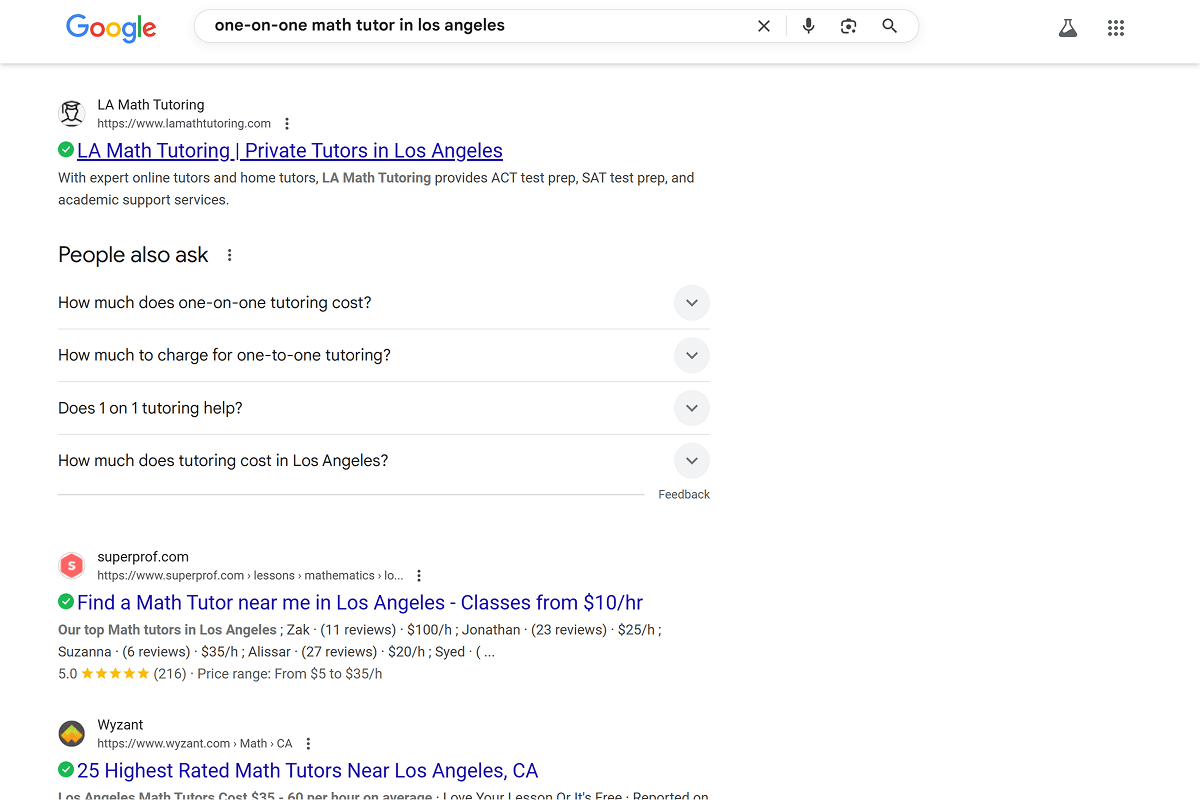How SEO Helps Your Tutoring Business Grow
Struggling to grow your tutoring business? 🤔 Running paid advertisements can bring quick results, but they are expensive. 💸 Content creation & marketing are effective, but it takes time, consistency, and effort.
However, SEO provides your tutoring business with passive organic growth. SEO is the only tool that gets you leads while you sleep. 😴
With SEO, your tutoring website attracts organic traffic from search engines like Google without paying for every click. Once your site ranks for relevant keywords like “online English tutor” or “math tutoring for high school,” it works 24/7 to bring you new students who are already searching for your services.

Here’s a quick analytics 📈: let’s say a keyword gets around 500 monthly searches. If you rank in the top spot, you can get 30-40% of that traffic, which is 150 to 200 visitors per month. With a 2-5% conversion rate, that’s 3-10 new student inquiries monthly on autopilot. That’s the power of SEO for tutors: long-term, cost-effective, and sustainable growth for your tutoring business.
Hi, I am Abdur, founder of Mabit Web Studio. For the past three years, I’ve been helping education businesses grow with conversion-focused websites and effective marketing strategies. In this article, I’ll walk you through what SEO is, why it’s beneficial for your tutoring business, and what you need to know to get started.
Table of Contents
What is SEO for Tutors?
SEO (Search Engine Optimization) is the process of improving your online presence so your tutoring business shows up when someone searches on Google, YouTube, or other platforms.

Let’s say a student goes to Google and searches for: ‘online French tutor’ or ‘one-on-one math tutor’ (In SEO, we call these search terms keywords). Google will show a list of websites that are relevant and optimized for that keyword.
If your tutoring website appears near the top, that’s SEO doing its job. You didn’t have to run ads or message anyone. A student searched, your site showed up, they clicked, and you got a visitor. That’s the power of SEO.
You might think SEO for tutors is too technical or hard to understand (at a certain time in my career, I did too 🥲). But the concept is simple. Here’s how it works:
- Search engines (like Google) try to show the most helpful and relevant results to people based on what they search.
- SEO helps search engines understand that your tutoring business is relevant, trustworthy, and worth showing to students.
- The better your SEO, the higher your website ranks, and the more students find you without spending a single dollar on ads.
In short, SEO is about optimizing your tutoring website, YouTube videos, and even your social media content to rank for specific keywords students are already searching for.
Benefits of SEO for Your Tutoring Business
If you want students to find you online, without running ads, chasing leads, or posting endlessly on social media, focusing on SEO should be your top priority!
SEO quietly works in the background 24/7, bringing in people who are already searching for the exact help you offer.

Here’s why SEO is one of the best long-term growth tools for your tutoring business:
1. More Visibility = More Students = More Revenue
When your tutoring website or content ranks for multiple keywords in your niche (for example: ‘business English tutor’, ‘one-on-one English tutoring’, ‘study IELTS online’), you’re putting your business in front of students who are actively looking for a tutor.
With keyword-targeted blog posts, landing pages, or helpful articles, your tutoring website can rank on Google for dozens of different searches.
More rankings = more traffic = more potential students = more revenue.
The same strategy works on YouTube and other social platforms. If your videos show up in search results (for example: “How to solve algebra equations” or “Tips for the TOEFL speaking section”), you start earning organic views, leading to free traffic and more exposure for your tutoring brand, services, and offers.
2. SEO Generates Passive Organic Growth
SEO is the only marketing tool that works 24/7. Unlike ads that stop the moment you stop paying. SEO continues to generate leads and visibility long after you publish a post or page.
While it’s true that ranking does take time, depending on your niche and competition, it might take 4-12 months for your site to rank on Google. But once your content ranks, it keeps working for you.
It doesn’t matter whether you are paying for ads, doing marketing and content creation, sleeping, or on vacation, your site will still attract new visitors and inquiries. That’s true passive lead generation.
3. It’s Cost-Effective and Sustainable
Paid ads can get you quick traffic, but they’re expensive, and the moment you stop spending, the results stop too. It’s a constant cycle of paying to stay visible.
SEO, on the other hand, is an investment in long-term visibility. Instead of renting traffic like you do with ads, you're building a digital asset that keeps working for you.
Now, to be honest with you, tutoring website SEO might feel like a big investment for new online tutors or small businesses. Creating optimized service pages, writing keyword-rich articles, and setting up your site’s SEO the right way takes both time and budget. But here’s the thing: it’s mostly a one-time investment if done properly.
Once your tutoring website is optimized and ranks well, it keeps attracting students without ongoing costs. That’s what makes SEO not just cost-effective, but one of the most sustainable growth tools for tutoring businesses.
SEO Basics Every Tutor Should Know
Some of the most essential parts of SEO for tutors are actually simple and easy to understand - no technical background required. While there are more advanced areas like Technical SEO, On-Page and Off-Page SEO, Schema Markup, and PR strategies, most of those are typically handled by SEO professionals or developers.

In this section, I’ll walk you through the core SEO fundamentals you need to know as a tutor: things like keyword research, SEO writing, local SEO, and ranking your content on Google and YouTube. These are the tools you’ll use regularly and that will help you attract students consistently, without diving deep into SEO.
How to Do Keyword Research for Your Tutoring Niche?
Keyword research is the process of finding out what your potential students are searching for on platforms like Google, YouTube, and other social media.
You want to discover phrases like “IELTS tutor online,” “1-on-1 English tutoring,” or “math tutor for middle schoolers.” These are called keywords. They help you understand what services or content people are actively looking for.
Some of the ways to find keywords:
- Google Search (look at autosuggestions and “People also ask”).
- Google Keyword Planner (free with a Google Ads account).
- Ubersuggest, AnswerThePublic, or Keywords Everywhere.
Once you know the right keywords, you can create content (webpages, blog posts, video titles, etc.) that ranks for those searches, bringing students straight to you.
If you want to learn more, here is an in-depth article by Hubspot on How to Do Keyword Research for SEO.
Writing Search Engine Optimized Content For Tutors
This means writing content (like your homepage, service page, blog, social media posts, or even video description) using keywords in a way that feels natural and helps search engines understand what your content is about.
Tips for writing SEO optimized content for tutors:
- Include your main keyword in your title, intro, and a few times throughout your content.
- Include variations of the main keyword and other related keywords naturally in your content.
- Answer the exact questions your audience is asking.
- Keep content clear, easy to read, and focused.
- Do not stuff keywords; that’s a red flag. Make sure the keywords are placed naturally inside the content.
This video explains the basics of Content Writing for SEO:
Google loves well-structured, helpful content. If your content is optimized well, it’s more likely to show up on search pages and stay there.
A quick reminder: don’t add keywords at the cost of quality. If your content is perceived as quality content by your audience, Google will consider that a good sign. So, don’t sacrifice the quality of the content for keywords.
Using SEO in Social Media Content
Yes, SEO applies to social media too, especially platforms like YouTube, LinkedIn, and even Instagram. These are also search engines in their own way.
Advice for optimizing content for social media:
- Use searchable titles and keywords in your video titles, captions, and hashtags.
- Add relevant keywords in your video descriptions on YouTube.
- Use niche-specific terms in your LinkedIn posts or bios.
If you make a YouTube video titled “How to Improve IELTS Speaking Score,” people searching that on YouTube may find your content - that’s organic discovery = free traffic.
For more explanation on this topic, check out this article that perfectly explains What is Social Media SEO.
What is Local SEO For Tutoring Business?
Local SEO helps you show up in searches like “tutor near me” or “math tutoring in LA.”
Quick guide to set up local SEO:
- Create and optimize a Google Business Profile (formerly Google My Business).
- Use local keywords like “Piano Tutor in Los Angeles” across your tutoring website and social media.
- Add your location to your website’s footer, contact page, and meta descriptions.
Here is a tutorial by Ahrefs on how to set up your local SEO:
If you’re serving students in a specific area (even if it's virtual but focused on a location), local SEO helps you dominate that space.
Writing Blogs That Rank on Google
Blogging is one of the most powerful SEO strategies for tutors, especially if you want to rank for lots of keywords over time.
Quick strategy for writing blogs:
- Pick a keyword topic (For example: “Best French learning tips for beginners”).
- Write a well-structured article that genuinely helps the reader.
- Use the keyword naturally in headings, intro, and conclusion.
- Add FAQs at the end to increase your chance of showing up in “People also ask.”
Each blog post is an opportunity to rank for a new keyword and bring in a new batch of potential students.
For a more in-depth guide on writing articles that rank on Google, check out this article by Hubspot on SEO Writing.
Importance of Backlinks for Tutoring Websites
Backlinks are links from other websites to your website. They’re like “votes of trust” that tell Google your tutoring website is legit and valuable.
Ways to get quality backlinks:
- Write guest posts for education blogs.
- Get featured in online directories or tutoring platforms.
- Collaborate with content creators or bloggers who can link to your content.
The more high-quality backlinks you have, the more Google trusts your tutoring website. That trust = higher rankings and more visibility.
To learn more about backlinks, check out this explanation by Backlinko on What Are Backlinks in SEO & Why You Need Them.
I hope this section gave you a solid understanding of the SEO basics. I originally planned to dive deeper into each topic, but quickly realized that would turn this article into a full SEO guide (and that’s a topic for another day 😅).
Hopefully, I plan to write a more in-depth, actionable guide specifically on SEO for tutors in the future. So be sure to subscribe to our newsletter!
Conclusion
If there’s one thing to take away from this article, it’s that SEO is one of the smartest long-term growth strategies for your tutoring business. Unlike paid ads that drain your budget, SEO continues working quietly in the background, bringing in students who are actively searching for the exact help you offer.
From ranking your tutoring website on Google to getting free organic views on YouTube, SEO increases your visibility, builds trust, and helps you attract more students consistently, all without having to hustle 24/7 or burn through your ad budget.
Yes, SEO is a long-term investment; it takes time and effort. But that’s what makes it worth it. It's sustainable, scalable, and gives you long-term control over your sales funnel.
Start small & stay consistent. Write articles, optimize your homepage, and create helpful optimized content on your socials. Over time, it compounds.

